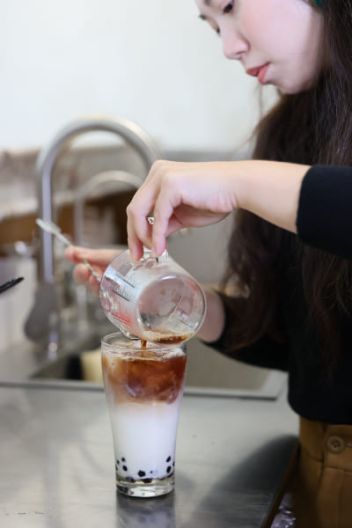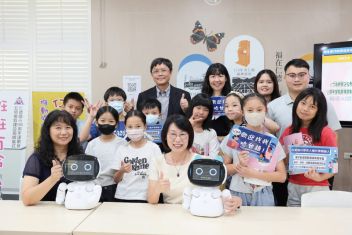
Mega Master Technology’s father-and-son team of L.C. Yu (left) and Sean Yu (right) see the development of ecofriendly polymer foams as part of their duty to the environment.
The burning of waste materials continues to release dioxins, which are persistent pollutants, into the environment. Many everyday products still contain formaldehyde, a Group 1 carcinogen. Increasing demand for and use of plastics and other polymer-based materials, which are both inexpensive and the source of the majority of these two pollutants, have worsened the damage to the environment. Are there no alternatives? Taiwan’s Mega Master Technology Co. argues that there are. An environmental pioneer determined to eliminate the use of dioxins and formaldehyde, the company is one of the world’s top three makers of ecofriendly polyolefin foams.
When Nan Ya Plastics licensed irradiation-crosslinked polyethylene technology in 1997, the innovation to polymeric foam manufacturing made environmentally friendly and odorless products a real possibility. L.C. Yu was a top agent for Taiwan’s filament-yarn fabric industry at the time, and thought: “This is my chance to do the right thing for the living things of the Earth.” A devout Buddhist, Yu decided to use his savings to start what would eventually become Mega Master Technology, focusing the company on the development of environmentally friendly foams. His youngest son, Sean, then a graduate student, jumped at the chance to help him build the new venture from the ground up.
A decade in the making
No longer a young man, Mega Master founder and president L.C. Yu is nonetheless hale and hearty, and his voice fills with pride when he talks about Sean Yu, who is now the company’s CEO. The elder Yu taught all of his sons that they needn’t be number one at everything they do. “Anywhere in the top five is fine. It’s too easy to lose your edge and to forget to be humble if you’re always number one.”
Unlike chemically linked polymeric foams, which break down in water, become brittle with age, can’t be recycled, and release deadly toxins when burned, Mega Master’s irradiation-crosslinked polymer foams are nontoxic, highly stable, and structurally solid, with long useful lives. “We began development in 1997, and lost money for the next ten years,” says Sean Yu, recalling the company’s difficult early years. “Then an electrical fire in 2010 burned down the factory, and with it more than two years of work.” L.C. Yu wondered if the universe was telling him to give up, but Sean urged his father to reconsider: “We have to stick to our founding principle—to put the environment first. And if we stumble, we have to pick ourselves up and keep going.”
The elder Yu says, “We made a new start on that day. We couldn’t give up because we had a responsibility to the world.”
In fact, the Yus ended up finding new motivation in the fire. Mega Master Technology arose from the ashes the following year, and its technology upgrades over the next few years propelled its eFoam brand of environmentally friendly foams into the top three in the world in terms of market share. The company’s success stemmed from the Yus’ shared goals. Sean explains, “My father and I think the same way. Our objective with Mega Master has never been making money. We went into the international market in hopes of making the world see the potential of environmentally friendly plastics, see that they could replace traditionally manufactured foams and leave a cleaner planet for the generations to come.” Mega Master’s road to success has been paved by their indomitable faith and idealism.
Environment before profit
From a distance, Mega Master looks more like an ecological museum than a corporation. Dozens of huge old trees rise in front of the headquarters building. Manufacturing and logistics are located in a wood behind the headquarters, and the whole facility is surrounded by flowering trees and fruit trees. L.C. Yu takes particular care of the Japanese juniper on the grounds. Known to be fussy about their environment, Japanese juniper symbolize longevity and are highly regarded in Japanese-style garden landscaping. Mega Master has more than ten lush and beautiful Japanese juniper on its grounds.
“When customers have questions about whether Mega Master’s products are truly environmentally friendly, I take them for a walk around our facility, which immediately wins them over,” says the elder Yu. “We do all of our manufacturing and packaging here. The trees and flowers wouldn’t be this healthy or bloom year round if even the tiniest of our processes caused environmental harm.” He sees this eco garden as “the strongest testament” to the quality of the company’s environmentally friendly foams.
L.C. Yu turned the company’s management over to his son soon after founding it, and Sean has proved to be a canny leader. “In Mega Master’s early days, we were the only Taiwanese company to acquire this technology. Our commitment to making only environmentally friendly foams enabled us to set down deep roots in the market for these materials, refine our products and processes, and study the feasibility of combining our products with other nontoxic materials to create composite materials.” Once its irradiation crosslinking technology matured, Mega Master began working on new products that built on its foams’ advantages, guiding its development pipeline with its own version of a “three nos” policy: no rejection of challenges posed by customers, no fear of development failures, and no change of focus.

Mega Master’s sustainable eFoam soundproofing pads have a closed-cell structure. Coupled with its patented method for bonding the pads to concrete, they completely isolate structures from the most common sound transmission medium: water. The product has proved popular at building materials expos.
Many niches
Polymeric foams are materials with broad applications. But traditionally manufactured foams have fatal flaws, including a short useful life, toxicity, and a lack of recyclability. Mega Master has solved all three problems by developing foams that are ecofriendly, noncarcinogenic, and sustainable. “The market for foams is huge. Their applications are limited only by the producer’s manufacturing capabilities, imagination and grasp of the market,” says Sean Yu. “If you’re dealing with a customer from a different field and can meet their demands, you have the potential to create a brand-new market.”
“Whether upstream, downstream or end-product client, once they’ve worked with Mega Master, they almost always continue to use our eFoam materials.” Sean Yu explains the reasons that they’ve been able to win customers’ loyalty and become their go-to replacement for other brands: “First, there’s our integrity. Next, we [make the effort to] understand our customers’ needs, aren’t afraid of difficult demands, and don’t skimp to produce exactly the materials they want. When a customer wants another product with a new capability, they immediately think, ‘Let’s have Mega Master develop it.’ It pushes our partnerships into a virtuous cycle.” Yu is committed to making high cost-performance products, and Mega Master has earned the loyalty of customers from around the world by developing tailor-made products for them. As a result, the company’s client list includes the likes of Samsung, LG, Shimano, Nissan, Bauer, and Great Wall Motors. Mega Master even makes the foam used for the best-known brand of picture hanging strips.
The Palace Museum in Beijing also uses Mega Master materials to pack the items from its collection when it ships them abroad for exhibitions. “Our materials are being used to pack items that are thousands of years old, so they have to be completely clean, nontoxic, and free of volatile organic compounds,” says Sean Yu. “If they weren’t, they could damage the artifacts.” The company’s primary customers for eFoam packing materials are in the European Union, which has strict environmental regulations. The products are used to transport precision instruments, as well as valuable items made from ceramic or metal.
Revisions to the Building Technical Regulations implemented on January 1, 2021 by Taiwan’s Construction and Planning Agency require the walls of new buildings to include soundproofing. Mega Master has developed an eFoam construction material that is not only lightweight, odorless, and water resistant, but also increases sound insulation by 20 decibels, provides temperature insulation, and will last for decades. As Sean Yu says, the company does its utmost to develop products for every niche in which eFoams might have an application, in order to create safer living spaces.
“Threefold reward” management philosophy
A practicing vegetarian for 20 years, Sean Yu’s “Buddhist ideas, rational working style” approach to running the company and his warm personality have made him good at listening to employees explaining difficulties they face in doing their jobs. And his rational working style means that he doesn’t jump to conclusions about his employees’ value to the company.
Yu understands that some problems take time to solve, that acting hurriedly can distort one’s perspective. “I don’t want my employees to tell me something ‘good’ or ‘bad,’ but something true. I want to make fact-based judgments so I can be a bridge for communication between departments. And I want to wait for the right moment to solve problems so that I can resolve issues in their entirety all at one go. That’s how you create win‡win solutions and good karma for everyone. [On the other hand,] when you rush, you break things. This is what Buddhists mean by the ‘right moment.’”
Yu has a “threefold reward” management philosophy: “The first reward is salary. The second is my trust. The third is employee empowerment.” He believes that this is how you find true talent. “You certainly suffer at first. Losses and betrayals are just part of the process. But I learn who can be trusted and who can take on major responsibilities. I can then spend some time making adjustments, and build a company with a virtuous cycle within.” This approach to management has created a company that works as one from top to bottom, and enabled Mega Master to become a powerful force for environmental protection.
“Things you can’t take with you, like money, you can turn into ‘real investments’ that you leave for all living things, that you give back to the world. Let’s end environmental harm in this generation.” Having passed this ideal down from father to son, the Yus have shaped Mega Master Technology into a Taiwanese hidden champion, one that’s putting a stop to environmental damage.











